一般将来时讲解上课讲义
- 格式:doc
- 大小:18.00 KB
- 文档页数:2


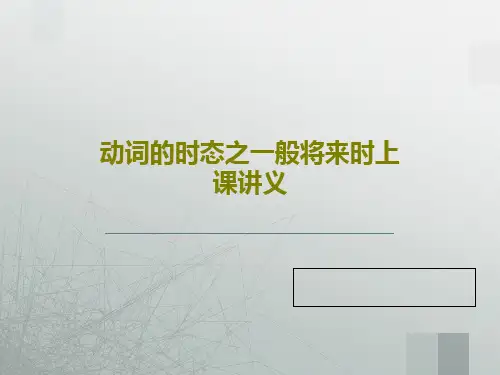
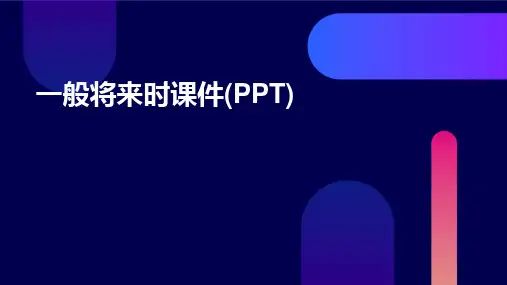
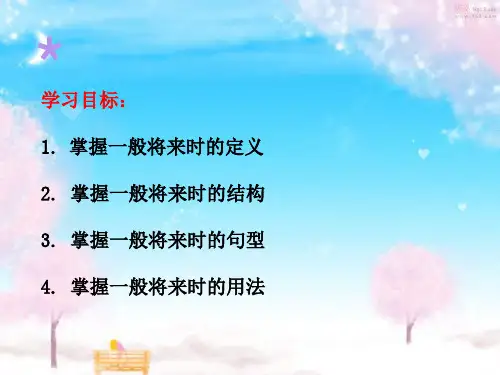

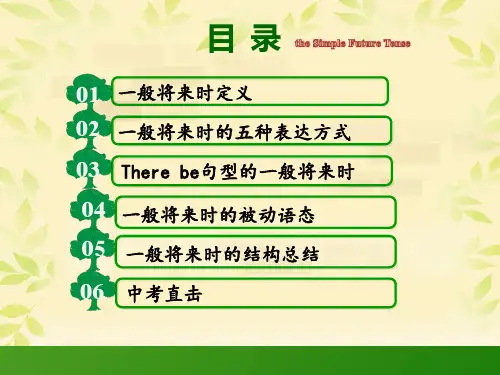
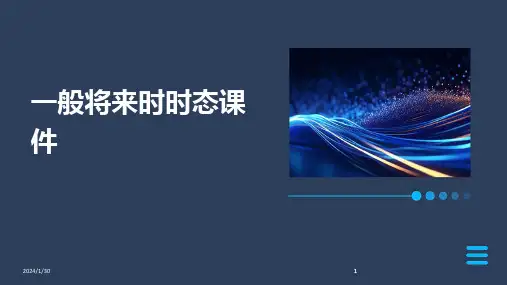


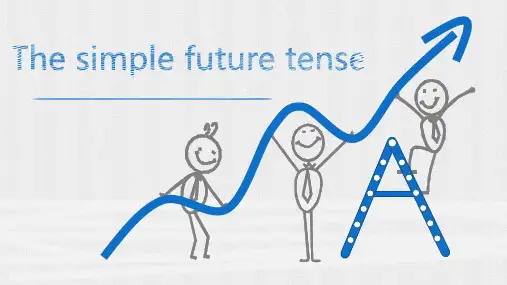
牛津英语7b英语语法(三)一般将来时一、一般将来时的动词形式一般将来时表示将来某个时间将要发生的动作或存在的状态,也表示将来经常或反复发生的动作。
一般将来时由助动词shall或will加动词原形构成,shall用于第一人称,will用于第二、三人称。
但是现在第一人称一般也用will,其区别并不明显。
(或“be going to + 动词原形)常与tomorrow, next… , in (the)future,soon, in five days,in two weeks等连用。
如: I shall not come if it rains tomorrow.如明天下雨我就不来。
My father will leave for China next week.我的爸爸下星期要到中国去。
“I’ll, You’ll, He’ll , She’ll , It’ll, We’ll , They’ll …”是简缩形式。
二.一般将来时的句型1.肯定句:主语+shall /will+动词+其他成份The workers will build a new school here next year.工人们明年将在这儿盖一所新学校。
They will go shopping this afternoon. 今天下午他们将要去购物。
We shall have a delicious dinner tonight. 今晚我们将美餐一顿。
We shall be there before dark. 我们天黑前会到达那里。
2.否定句:主语+shall /will+not+动词+其他成份She won’t come back this week.这一周她不回来了。
I will not go shopping one hour later. 一小时之后我不会去购物。
He won’t play football with you before he finishes his work.他干完活后才能跟你踢足球。
初中一般将来时讲义【含答案】一、一般将来时的定义表示将来某个时间发生的动作或状态二、一般将来时的结构I will meet you at the airport. I’m going to go hiking this weekend.结构:结构:三、will和be going to do的区别:1. be going to表示主观上计划或安排将要去做的事情2. will多用于客观上要发生的事情,或临时决定要做的事情四、句式转换1. I’m going to take a photo tomorrow.(否定句)(一般疑问句,并写出肯否回答)(对划线部分进行提问:I’m going to take a photo tomorrow.)2. He will finish his homework.(否定句)(一般疑问句,并写出肯否回答)(对划线部分进行提问:He will finish his homework.)五、一般将来时的标志词1. tomorrow类:tomorrow afternoon,the day after tomorrow2. next类:next week, next summer, next year3. in+时间段:in two days, in a week4.其他:in the future, one day, someday【课堂练习】1. We don’t know when __________ next week. Please call me when he arrives.A. will he arriveB. does he arriveC. he will arriveD. he arrives2. —How soon will he come back to Guangzhou?—I have no idea. Maybe he __________ in one or two days.A. will comeB. comesC. comeD. came3. ---will the train arrive?---It the station in 50 minutes.A. How soon; will get toB. How soon; arriveC. How long; will reachD. How far; gets to4. Will you at the bus stop at 10:30?A. meetingB. meetsC. meetD. met5. Lily and I to the concert it we free next week.A. go; areB. go; will beC. will go; will beD. will go; are初中一般将来时讲义(答案)一、一般将来时的定义表示将来某个时间发生的动作或状态二、一般将来时的结构I will meet you at the airport. I’m going to go hiking this weekend.结构:will+动词原形结构:am/is/are going to+动词原形三、will和be going to do的区别:1. be going to表示主观上计划或安排将要去做的事情2. will多用于客观上要发生的事情,或临时决定要做的事情四、句式转换1. I’m going to take a photo tomorrow.(否定句)I’m not going to take a photo tomorrow.(一般疑问句,并写出肯否回答)---Are you going to take a photo tomorrow?---Yes, I am. / No, I’m not.(对划线部分进行提问:I’m going to take a photo tomorrow.)What are you going to do tomorrow?2. He will finish his homework.(否定句)He will not finish his homework.(一般疑问句,并写出肯否回答)---Will he finish his homework?---Yes, he will. /No, he won’t.(对划线部分进行提问:He will finish his homework.)What will he do?五、一般将来时的标志词1. tomorrow类:tomorrow afternoon,the day after tomorrow2. next类:next week, next summer, next year3. in+时间段:in two days, in a week4.其他:in the future, one day, someday【课堂练习】1. We don’t know when __________ next week. Please call me when he arrives.A. will he arriveB. does he arriveC. he will arriveD. he arrives2. —How soon will he come back to Guangzhou?—I have no idea. Maybe he __________ in one or two days.A. will comeB. comesC. comeD. came3. ---will the train arrive?---It the station in 50 minutes.A. How soon; will get toB. How soon; arriveC. How long; will reachD. How far; gets to4. Will you at the bus stop at 10:30?A. meetingB. meetsC. meetD. met5. Lily and I to the concert it we free next week.A. go; areB. go; will beC. will go; will beD. will go; are。
一般将来时1.一般将来时的基本概念一般将来时表示将来某一时刻的动作或状态,或将来某一段时间内经常的动作或状态。
一般将来时由助动词shall(第一人称),will(第二、三人称)+动词原形构成。
美国英语则不管什么人称,一律用will.2.一般将来时的形式●will 常简略为 'll,并与主语连写在一起,如:I’ll,he'll,it'll,we’ll,you'll,they’ll。
●一般疑问句如用will you…?其简略答语须是Yes,I will或 No,I will not;如用 Shall you…?(较少见)其简略答语须是 Yes,I shall.或 No, I shall not.。
3.一般将来时的用法1)表示将来的动作或状态一般将来时常与一些表示将来的时间状语连用,如:tomorrow(明天), next week(下周), from now on(从现在开始);in the future(将来)等.2)表示将来经常发生的动作。
4.一般将来时的其他用法一般将来时表示将来某一时刻的动作或状态,其表达形式除了“shall(第一人称),will(第二、三人称)+动词原形构成”外,还有以下几种形式.1)“to be going to+动词原形”表示即将发生的或最近打算进行的事.例如:①It is going to rain。
要下雨了。
②We are going to have a meeting today. 今天我们开会。
2)go, come,start,move,sail,leave,arrive,stay等可用进行时态表示按计划即将发生的动作,例如:I'm leaving for Beijing。
我要去北京.3)“be to+动词原形”表示按计划要发生的事或征求对方意见。
例如:①Are we to go on with this work?我们继续干吗?②The boy is to go to school tomorrow.这个男孩明天要去上学。
一般将来时讲解与练习
一、概念:表示将要发生的动作或存在的状态及打算、计划或准备做某事。
句中一般有以下时间状语:
tomorrow, next day(week, month, year…),soon,
the day after tomorrow(后天)等。
二、基本结构:①be going to + do;②will+ do.
三、否定句:在be动词(am, is, are)后加not或will后加not成
won’t。
例如:I’m going to have a picnic this a fternoon.
→ I’m not going to have a picnic this afternoon.
四、一般疑问句:be或will提到句首,some改为any, and改为or,
第一二人称互换。
例如:We are going to go on an outing this weekend.
→ Are you going to go on an outing this weekend?
五、对划线部分提问。
一般情况,一般将来时的对划线部分有三种情
况。
1. 问人。
Who
例如:I’m going to New York soon.
→Who’s going to New York soon.
2. 问干什么。
What … do.
例如:My father is going to watch a race with me this afternoon. →What is your father going to do with you this afternoon.
3. 问什么时候。
When.
例如:She’s going to go to bed at nine.
→When is she going to bed?
六、同义句:be going to = will
I am going to go swimming tomorrow(明天).
= I will go swimming tomorrow.
七、be going to和will 的区别
be going to和will 的用法虽然都表示将来发生动作或情况,但
它们的用法是有区别的。
现本人就牛津小学英语课本归纳、浅析如下:
(1)be going to主要用于:
1、表示事先经过考虑、安排好打算要做的事情。
E.g.
What are you going to do today?
今天你们打算做什么?
Dad and I are going to see a Beijing opera this afternoon.
今天下午我和爸爸打算去看京剧。
I’m going to play the violin.
我打算拉小提琴。
She’s going to play the piano. 她打算弹钢琴。
(2)、表示根据目前某种迹象判断,某事非常有可能发生。
E.g.
Look! There come the dark clouds. It is going to rain.
瞧!乌云密集,天要下雨。
I am afraid I am going to have a cold.
恐怕我要患重感冒。
(2) will主要用于在以下几个方面:
1、表示单纯的未来“将要”通用各个人称。
eg:
They will go to visit the factory tomorrow.
明天他们将去工厂参观。
I’ll come with Wang Bing, Liu Tao and Yang Ling.
我将和王兵、刘涛、杨玲一起来。
2、表示不以人的意志为转移的自然发展的未来的事。
eg:
Today is Saturday. Tomorrow will be Sunday.
今天是星期六。
明天是(将)是星期日。
He will be thirty years old this time next year.
明年这个时候他就(将)三十岁。
3、问对方是否愿意做某事或表示客气地邀请或命令。
eg:
Will you please turn on the radio? 请打开收音机好吗?
Will you go to the zoo with me? 你和我一起去动物园好吗?。